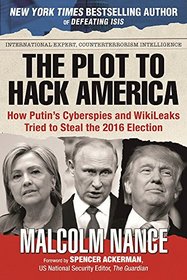What is âknownâ? If, by âknownâ, you mean âin possession of irrefutable evidenceâ, you are not destined to work in the intelligence community. On the other hand, if you can deal with educated interpretations of various pieces of evidence, and can live with words like âhigh certaintyâ, âlikelyâ, and âhighly improbableâ, you might do well in that field.
I bring this up because it is the basis of Malcolm Nance's book âThe Plot to Hack America: How Putin's Cyberspies and WikiLeaks Tried to Steal the 2016 Electionâ. If a foreign power undertook an effort to influence an American election, the likelihood that they would leave behind incontrovertible evidence is almost nil. (Aside: The likelihood that the people finding that evidence would survive to report on it could also be questionable.) Author Nance interprets various pieces of evidence â finding a computer worm that was originally coded using a Cyrillic keyboard, spoof websites that are based in former Russian satellite states, and admissions made publicly by 3rd parties â to paint a picture that Russia's leader wanted to ensure the results of the 2016 Presidential election were acceptable to him and his interests.
It must be pointed out that the author never claims that Republican candidate and eventual winner Donald Trump was an active party to these mechanisms. (There is a possibility, however, that some of his advisers â ones outside of the official campaign structure â had some level of awareness.)
This book is definitely worth a read.
Rating: 4 1/2 stars, rounded up to 5 stars where 1/2 stars are not permitted.
DISCLOSURE: This book was provided free of charge in a random draw. No conditions were placed upon entry or acceptance, but a request for an honest and prompt review was implied.
I bring this up because it is the basis of Malcolm Nance's book âThe Plot to Hack America: How Putin's Cyberspies and WikiLeaks Tried to Steal the 2016 Electionâ. If a foreign power undertook an effort to influence an American election, the likelihood that they would leave behind incontrovertible evidence is almost nil. (Aside: The likelihood that the people finding that evidence would survive to report on it could also be questionable.) Author Nance interprets various pieces of evidence â finding a computer worm that was originally coded using a Cyrillic keyboard, spoof websites that are based in former Russian satellite states, and admissions made publicly by 3rd parties â to paint a picture that Russia's leader wanted to ensure the results of the 2016 Presidential election were acceptable to him and his interests.
It must be pointed out that the author never claims that Republican candidate and eventual winner Donald Trump was an active party to these mechanisms. (There is a possibility, however, that some of his advisers â ones outside of the official campaign structure â had some level of awareness.)
This book is definitely worth a read.
Rating: 4 1/2 stars, rounded up to 5 stars where 1/2 stars are not permitted.
DISCLOSURE: This book was provided free of charge in a random draw. No conditions were placed upon entry or acceptance, but a request for an honest and prompt review was implied.




